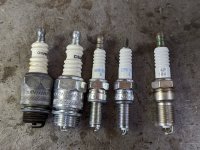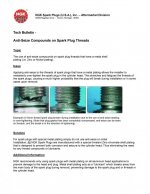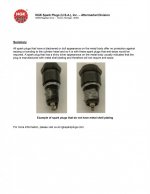QuantiQualification
Active member
- Joined
- Feb 1, 2023
- Messages
- 168
Welcome to the Honda Trail 125 Forum! We are an enthusiast forum for the Trail 125, Hunter Cub, CT125 or whatever it's called in your country. Feel free to join up and help us build an information resources for this motorcycle. Register a free account today to become a member. Once signed in, you'll be able to participate on this site by adding your own topics and posts, as well as connect with other members through your own private inbox!
 ngksparkplugs.com
ngksparkplugs.com
1. Anti-seize
NGK spark plugs feature trivalent plating. This silver or chrome-colored finish on the threads is designed to provide corrosion resistance against moisture and chemicals. The coating also acts as a release agent during spark plug removal. NGK spark plugs are installed at the factory dry, without lubrication or anti-seize.
Anti-seize can act as a lubricant, altering torque values up to 20 percent, increasing the risk of spark plug thread breakage and/or metal shell stretch. Thread breakage can sometimes involve removing the cylinder head for repair. Metal shell stretch changes the heat rating of the spark plug and can result in serious engine damage caused by pre-ignition. Do not use anti-seize or lubricant on NGK spark plugs. It is completely unnecessary and can be detrimental.
Thank you!Most useful thing I have seen all day!

That is amazing information @dmonkey. I did not know the technology had changed for NGK spark plugs. I will definitely post that information in the video's description and see if I can edit the video to remove the anti-seize portion. Off-hand, do you know if other brands of spark plug also not require anti-seize? If you don't mind, I might even do a video around just that topic.Do not use anti-seize on NGK plugs. Or if you do, which they claim isn't necessary, decrease the torque value to compensate for it.
Anti-seize on spark plugs is a holdover of people doing the same things they learned decades ago, or teaching others to do those things, while the products have mostly changed and no longer require it. If you're not running an old style or model of unplated sparkplug (probably new-old-stock) in an aluminum head, which is the issue it was mostly used to address, then you probably don't need it. Check the manufacturer recommendations.
5 Things You Should Know About Spark Plugs - NGK Spark Plugs
The five things you should know about spark plugs include information on anti-seize, corona stain, gapping fine wire, torque and copper spark plugs.ngksparkplugs.com
Yeah, kinda my problemunless you're a ham-fisted oaf.
@m in sc I mostly agree with you but I do make these videos for a relatively broad audience. I can't dictate what experience the viewer may or may not have. Good point on multiple pulling of plugs. I am certain the manufacturer's coating is good for at least the first insertion . . . but the tenth? I have owned and fixed up 50+ vehicles and I do believe that the Honda Trail 125 is one of the very few I have put a plug in using a torque wrench. That being the case, I have seen people really crank a spark plug in and also have seen spark plugs ejected because they weren't! Torque wrench definitely will solve this.thats hilarious.C'mon guys, nth degreeing spark plug torque is fkn ridiculous.
I also personally know a lot of racers that use copper anti seize on their vintage 2 stroke motors that they pull the plugs out of 10 times on a race weekend. and these are custom cut heads that arent easily replaceable.
If you cant feel a sparkplug is tight after you've done it a few times, maintenance might not be your thing.
I agree, its useful info to have and absolutely deserves a mention... but the reality of it is, not something you need to really worry about unless you're a ham-fisted oaf.
 www.advrider.com
www.advrider.com
 ngksparkplugs.com
ngksparkplugs.com




Click, Beam, or Digital?Oh boy, this has gone oil thread! lol
